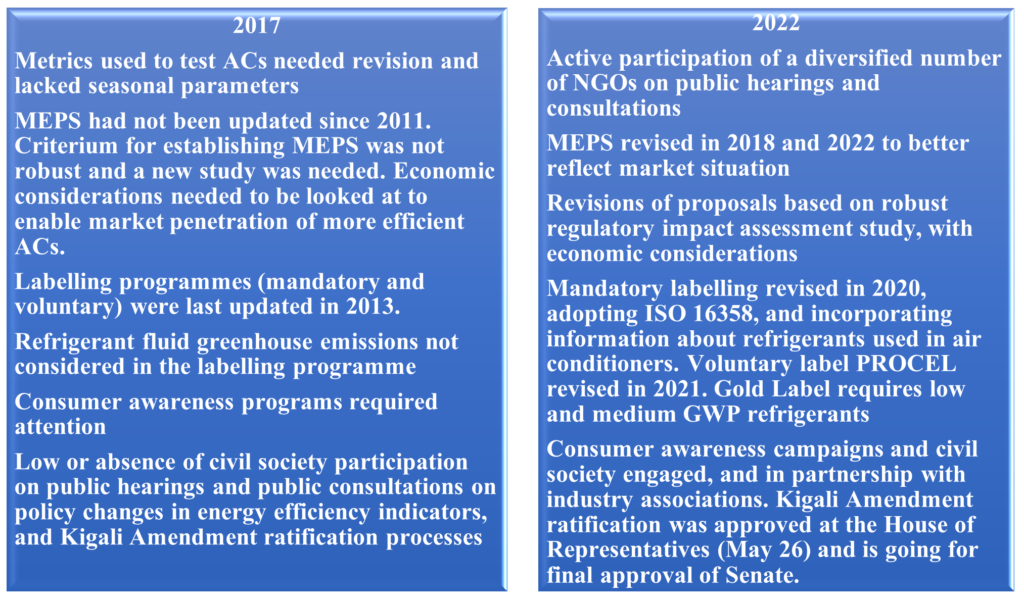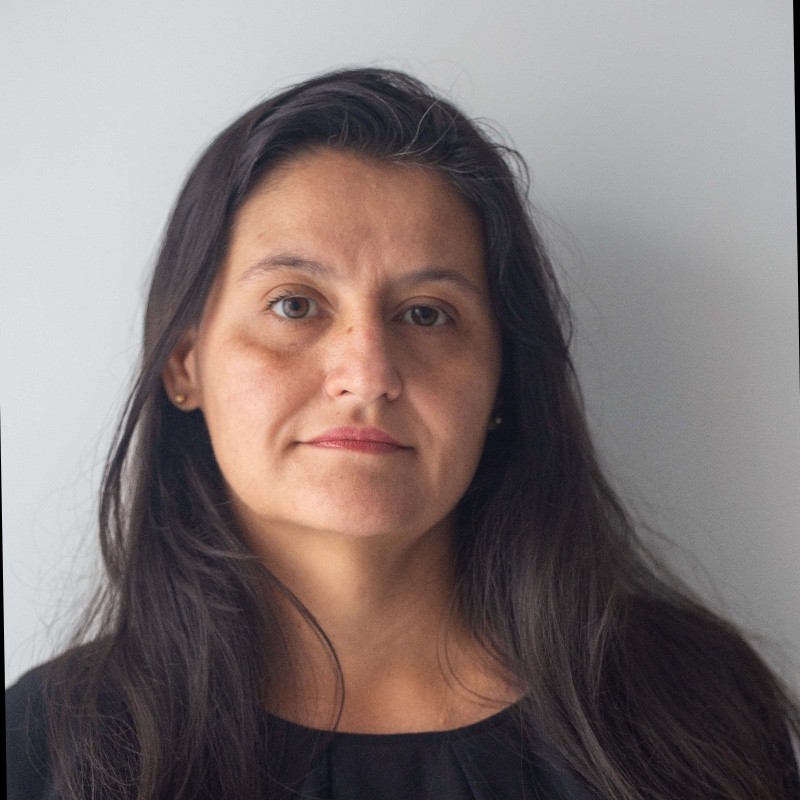Abstract
This paper explains how Brazil in the air conditioning (AC) sector has responded to the 2016 Kigali Amendment to the Montreal Protocol on Substances that Deplete the Ozone Layer (Montreal Protocol) in a project funded by The Kigali Cooling Efficiency Programme (K-CEP) implemented by the Instituto Clima e Sociedade (ICS). When the project began in 2017, most ACs sold in Brazil were low energy efficiency fixed-speed based on ozone-depleting greenhouse gas (GHG) R-22 with increasing numbers of ACs using ozone-safe high-global warming potential (GWP) R-410A coming into the market.
The Project focused on strengthening Minimum Energy Performance Standards (MEPS) and consumer product Labelling; developing and implementing new testing methodology; and increasing accessibility to low GWP refrigerants to enable Brazil to speed ratification of the Kigali Amendment of the Montreal Protocol.
The paper explains in detail how the project organized technical support in partnership with Lawrence Berkeley National Laboratory (LBNL)[4] and the Collaborative Labelling and Appliance Standards Program, (CLASP)[5] to urgently update MEPS and labelling in Brazil.
The strong technical and media support allowed the execution of consumer awareness campaigns and the submission of evidence-based contributions to public hearings by civil society and the participation of a diversified number of NGOs.
MEPs were reviewed in 2018 and again on 29 April 2022. Mandatory and voluntary labelling were also revised and in 2021 a voluntary Gold-label was introduced, incorporating energy efficiency and refrigerant fluid criteria.
The work in partnership with so many partners from industry associations, academia, NGOs and Government earned ICS the “K-CEP Strongest Collaborators Award” in 2021.
Introduction
As related to the residential air conditioning market in Brazil, the majority of Brazilian RAC in the local market in 2017, were low-efficiency fixed-speed using hydrochlorofluorocarbon (HCFC-22) as the refrigerant. In addition, when questioned why more efficient equipment was not in the market, especially with both HCFC-22 phaseout schedule and the Kigali Amendment to phase-down hydrofluorocarbons (HFCs), manufacturers of AC in Brazil named several barriers, such as :
- the metrics used by the government institution testing ACs needed revision, as more efficient inverters were tested as if they had inefficient fixed speed compressors. Introduction of new metrics with seasonal parameters, which were more appropriate for a country with the size of Brazil, was called for;
- revision of the regulatory framework (MEPS), which had not been updated since 2011 and the needed revision of the Labelling programme, last updated in 2013;
- criterium for establishing MEPS was not robust and a new assessment was needed;
- economic considerations needed to be looked at to enable market penetration of more efficient ACs;
- lack of consideration of the refrigerant fluid, in terms of its potential for CO2 equivalent emissions, in the labelling programme;
- consumer awareness programs required attention especially in times of high energy tariffs and hydric crises, with environmentally unfriendly and expensive energy from thermoelectric plants having to cover for the energy demand from the hydroelectric ones.
- low or absence of civil society participation on public hearings and public consultations on policy changes in energy efficiency performance indicators, and in the Kigali Amendment ratification process
Without addressing those barriers, the AC market would continue to be flooded with a mix of efficient and inefficient units, all labelled as “top of the class A”, with loss of environmental and economic benefits for not properly labelling the products, and not properly informing consumers.
In addition, the lack of ratification of Kigali Amendment by the government of Brazil, old MEPs, and other barriers, caused concern of potential “dumping” of inefficient air conditioners in Brazil. This was detailed in a publication[6] in partnership with the Institute for Governance & Sustainable Development (IGSD)[7], which formed the basis for the design of an action plan to address those barriers and the work described in this paper.
The Brazilian Kigali Project and the Kigali Network (Rede Kigali)
In order to tackle those barriers in preparation for the implementation of the Kigali Amendment[8] to the Montreal Protocol[9] while maintaining and/or enhancing the energy efficiency, the K-CEP[10] funded a project in the residential air conditioning sector in Brazil named Kigali Project, which was implemented by ICS[11]. This happened one year after the Kigali Amendment was approved in 2016 in Kigali (Rwanda).
The Kigali Project focused on supporting regulatory as well as introduce consumer-directed actions. It included enhancing Energy Efficiency (EE) level of existing Standards and Labelling programmes; equipment energy performance testing methodology changes to consider variable-speed compressors (inverters) and seasonal variances; market driven actions to increase accessibility to low and medium GWP refrigerant fluids; and actions to enable Brazil to speed up the ratification of the Kigali Amendment of the Montreal Protocol.
The creation of a network of a diversified number of non-governmental institutions to support actions, named Kigali Network (in Portuguese, Rede Kigali), and project financial support from K-CEP were key for the success of several actions by the network, which was coordinated by ICS.
Enabling Institutional Infrastructure and Capabilities
Brazil’s Energy Efficiency Law, number 10295 (17 October 2001), provides for the National Policy for the Conservation and Rational Use of Energy, attributing the execution to the federal government (Minister of Energy) and giving it the power to establish maximum levels of energy consumption or minimum energy performance levels of machines and appliances manufactured or sold in Brazil. Decree number 4059 (19 December 2001), regulated by Law 10295, created the Energy Efficiency Indicators Management Committee-CGIEE. The committee guarantees that: a) minimum level of energy efficiency is established according to specific regulations, b) the process is based on impact assessment and prioritization, conformity assessment criteria and supported by accredited laboratories for tests and trials, and c) mandatory public hearings are held.
Brazilian government implements another key policy for appliances’ energy efficiency – the Brazilian Labelling Program (PBE), coordinated by INMETRO[12]. Most part of cooling appliances must hold an energy efficiency mandatory label that aims to provide key information for consumers’ best decision, such as: energy consumption and energy efficiency rating (varying mostly from E, the worst efficient, to A, the most efficient).
As a complementary policy, Brazil also provides an endorsement voluntary label, called Selo PROCEL[13], which informs consumers which are the top of the class energy efficient appliances available in the market. Selo PROCEL is coordinated by Eletrobras, a government owned energy company.
Revisions of the MEPS and Labelling were long due and the majority of residential AC commercially available in Brazil were in the “A” category. The equipment falling in this performance category had low efficiency when compared to the same model in the rest of the world. The support provided by the Kigali Project and based on a study of impact of the MEPS revision and costs[14] associated to manufacturers and consumers, done in partnership with LBNL, and CLASP[15], confirmed the urgency to update MEPS and labelling in Brazil.
In addition to mandatory labels, the PROCEL Label (voluntary)is managed by the Brazilian National Electricity Conservation Program (PROCEL) and was originally launched in 1995, with specific policies for window air conditioners in 1996 and for split-type air conditioners in 2004. The label is well-recognized and substantially influences consumer behaviour; 91% of consumer recognize the label and 68.3% say that they would pay 10% more for a product bearing the PROCEL Label.[16] Until recently, the criteria for the PROCEL Label was aligned with the criteria for the top labelling class on the comparative label managed by the mandatory PBE, coordinated by INMETRO.
The Kigali Project team also provided technical assistance, when requested, to the governmental institutions in charge of Standards and Labelling programmes and worked in partnership with them throughout the project and supporting the revision of MEPs and Labelling in Brazil. The last MEPS revision was made in April 2022[17].
Enabling Civil Society Engagement through Networking
According to national regulation, the government had to establish a public hearing before taking the decision to update the MEPS. Public hearings are an important vehicle to hear from stakeholders, including civil society organizations. However, these civil society groups were generally left unheard, mostly for lack of initiative, due to gaps in information and technical knowledge regarding the Montreal Protocol and its Kigali Amendment, the links to energy efficiency and its benefits, and the opportunities for low carbon dioxide (CO2) emissions and energy conservation in the refrigeration and air conditioning sector.
Kigali Project team, coordinated by ICS, recognized an opportunity to tackle public awareness and bring the voice of civil society into the public debate. This was accomplished by supporting and strengthening a network of NGOs which were considered able to pressure for improved MEPS and labelling revision, as well as, for the ratification of the Kigali Amendment by the National Congress, as required by law.
The creation of the Kigali Network (Rede Kigali) was the way to bring key civil society organizations/institutions to understand and discuss matters related to both Energy Efficiency, Kigali Amendment ratification and related actions to enable access to energy efficient and ozone and climate friendly technologies and use media and market driven mechanisms to increase access to low carbon emission technologies in the residential AC sector.
The following organizations were part of the Kigali Network: ICS (coordinator[18]); International Energy Initiative (IEI-Brazil)[19]; Instituto Brasileiro de Defesa do Consumidor (IDEC)[20], a consumer protection NGO; Engajamundo[21], a youth climate leaders NGO; and Healthy Hospitals Project[22], an organization that promotes sustainability in the health sector.
Mitsidi Projetos,[23] a consultancy company focused on technical assistance on energy efficiency, provided technical support to the network, and communication specialists, from Pulso Público,[24] supported the network to successfully reach media channels, such as TV and newspapers.
The strong technical and media support allowed the execution of consumer awareness campaigns to happen (such as Black Friday, to reduce selection of HCFC-22 low efficiency air conditioners), increase technical credibility of the project team with government officials and industry, facilitated reaching out to industry associations supporting energy efficiency improvements, the submission of evidence-based contributions to public hearings by civil society and bringing to congressmen the needed awareness of the need to speed up Kigali Amendment ratification process.
The progress and results can be seen in figure1.

Although the Kigali Network itself cannot claim being the sole responsible for the rapid and positive evolvement of Brazilian regulatory framework for residential air conditioning sector, with improvements in energy performance indicators and labelling, including the integration of the transition to lower global warming potential refrigerants, and the Kigali Amendment ratification process, it had an important role in:
- Pressuring for more transparency and the use of technical evidence/ assessment studies in the revision processes and pushing for studies that reflect local circumstances, and strengthening capacities at national universities (Melo et al. 2022)[25]
- Bringing data that allowed the comparison between Brazilian AC market and other key markets, and, thus, reinforcing the need to a more rigorous revision of energy efficiency domestic regulation
- Pointing out the inter-relation between energy efficiency and the Kigali Amendment implementation
- Bringing awareness of the need to speed up ratification of the Kigali Amendment to Brazilian Congress.
The work in partnership brought to ICS the “K-CEP Strongest Collaborators Award” awarded by the Kigali Cooling Efficiency Programme in 2021[26].
The Kigali Network continues its work focusing on achieving Kigali ratification in 2022 and working to support the continuous enhancement of energy efficiency standards and labels programmes (mandatory and voluntary) in order to bring to consumers the appliances in Refrigeration and Air-Conditioning sectors that can save energy and are climate friendly, and at a price they can afford.

Suely Machado Carvalho

Kamyla Borges Cunha

Rodolfo Gomes
References
[1] Dr. Carvalho, Senior Adviser, Kigali Project, ICS. https://www.climaesociedade.org/
[2] Dr. Kamyla Borges Cunha, Kigali Project Coordinator, ICS. https://www.climaesociedade.org/
[3] Mr. Rodolfo Gomes, Executive Director, International Energy Initiative, IEI, Brazil. https://iei-brasil.org
[6] Institute for Governance & Sustainable Development (IGSD), https://www.igsd.org
[7] Andersen S.O., Ferris R., Picolotti R., Zaelke D., Carvalho S., & Gonzalez M. (2018) Defining the Legal and Policy Framework to Stop the Dumping of Environmentally Harmful Products | Duke Environmental Law & Policy Forum, Duke Environmental Law & Policy Forum 29 (1): 1–48. https://scholarship.law.duke.edu/delpf/vol29/iss1/1/
[9] As of 23 May 2022, Brazil has not ratified the Kigali Amendment to the Montreal Protocol (https://ozone.unep.org/all-ratifications)
[10] https://www.cleancoolingcollaborative.org/blog/the-kigali-cooling-efficiency-program-an-exciting-new-philanthropic-initiative-makes-its-debut/
[11] https://www.climaesociedade.org/
[12] http://www.inmetro.gov.br
[13] http://www.procelinfo.com.br
[14] https://international.lbl.gov/publications/manufacturer-economics-and-national; https://www.eceee.org/library/conference_proceedings/eceee_Summer_Studies/2019/9-improving-energy-efficiency-in-ict-appliances-and-products/the-manufacturer-economics-and-national-benefits-of-cooling-efficiency-for-air-conditioners-in-brazil/
[16] BRACIER. “Uso de Etiquetas de Consumo de Energia Gera Economia de R$ 2.9 Bi em Dez Anos” 2015. http://bracier.org.br/noticias/brasil/5288-uso-de-etiquetas-de-consumo-de-energia-gera-economia-de-r-2-9-bi-em-dez-anos
[17] https://in.gov.br/en/web/dou/-/resolucao-n-1-de-29-de-abril-de-2022-396910853
[18] The Kigali project funding ended in 2021. The International Energy Initiative-Brazil (IEI-Brazil) is since the new national coordinator of the Kigali Network (Rede Kigali)
[22] https://www.hospitaissaudaveis.org
[24] https://www.pulsopublico.com.br
[25] Conrado Melo, Kamyla Borges Cunha and Gabriela Piovesan Suárez. “MEPS for air conditioners in Brazil: Regulatory developments and future perspectives”. Renewable and Sustainable Energy Reviews, Vol 163, July 2022. https://authors.elsevier.com/a/1e%7EtK4s9Hw629t
[26] Volume 3: Decision XXXIII/5 – Continued provision of information on energy-efficient and low-global-warming-potential technologies, May 2022. Technology and Economic Assessment Panel (TEAP). Suely Carvalho, Omar Abdelaziz, and Ashley Woodcock, co-chairs Energy Efficiency Task Force. Chapter 9.5. https://ozone.unep.org/system/files/documents/TEAP-EETF-report-may2022.pdf
